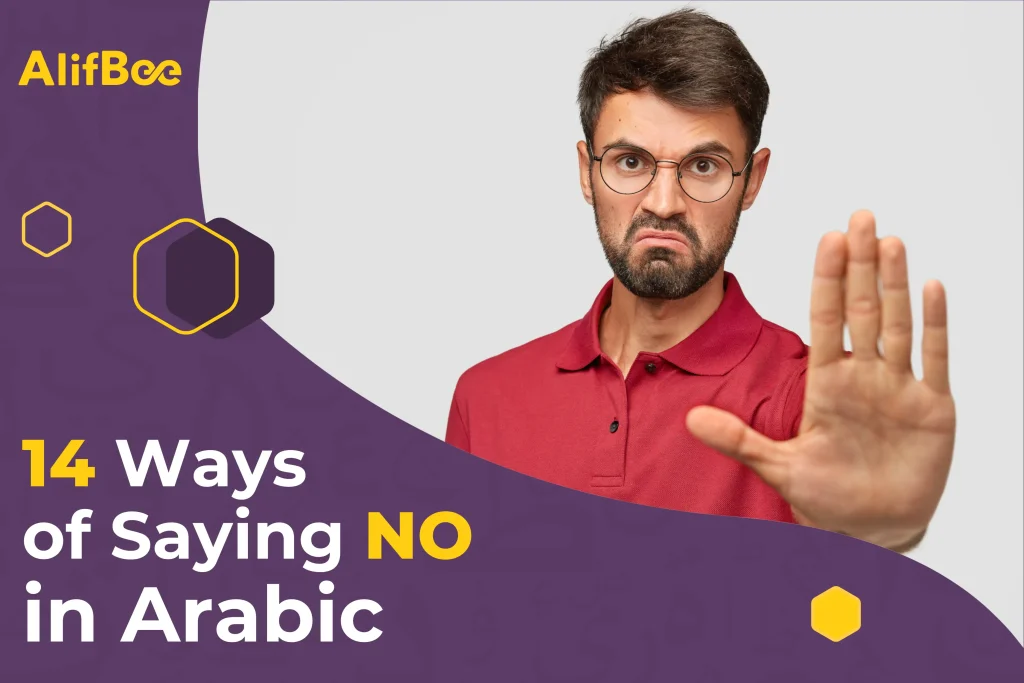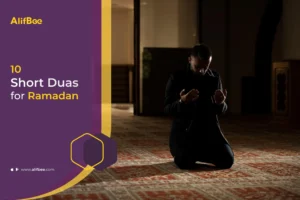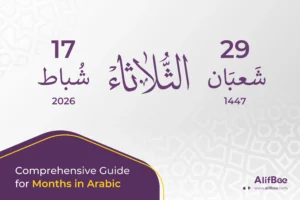After we have learned how to say yes in Arabic in an earlier blog, it’s time to learn how to say no in Arabic, as it is not less important, right?
Many of us find it hard to say no to others, let alone in another language. However, today we’ll take the first step to help make it easier by giving you the right Arabic words to use.
We’ll explore 14 ways to say no in Arabic. Each word or expression has its own context. For example, some are polite or formal, while others might sound more apologetic, kind, or even a bit firm. Let’s look at some of the most common and expressive ways to say no in Arabic.

Direct Ways to Say No in Arabic
When you need to be clear and firm, a direct “no” works best. These Arabic expressions leave no room for confusion and are often used when you’re refusing a request, expressing disagreement, or just stating a fact.
لَا
No
lā
English
Transliteration
Arabic
Would you like a cup of tea?
Hal turīd kūban min ash-shāy?
هلْ تُرِيدُ كُوبًا مِنَ الشَّايِ؟
No, thank you
Lā, shukran
لَا، شُكْرًا.
كَلَّا
Absolutely not
kallā
English
Transliteration
Arabic
Do you agree with this decision?
Hal anta muwāfiq ʿalā hādhā al-qarār?
هَلْ أَنْتَ مُوَافِقٌ عَلَى هذَا القَرَارِ؟
Absolutely not, I don’t think it’s appropriate.
Kallā, lā aʿtaqid annahu munāsib.
كَلَّا، لَا أَعْتَقِدُ أَنَّهُ مُنَاسِبٌ.
إطْلَاقًا
Not at all
iṭlāqan
English
Transliteration
Arabic
Do you mind if I take this?
Hal tumāniʿ law akhadhtu hādhā?
هَلْ تُمَانِعُ لَوْ أَخَذْتُ هذَا؟
Not at all, take it as you wish.
Iṭlāqan, khudhhu kamā tashāʾ.
إِطْلَاقًا، خُذْهُ كَمَا تَشَاءُ.
غَيرُ مُمكِن
Not possible
ghayru mumkin
English
Transliteration
Arabic
Can you please submit the report by the end of the day?
Hal tastaṭīʿu taslīma at-taqrīr qabla nihāyati al-yawm?
هَلْ تَسْتَطِيعُ تَسْلِيمَ التَّقْرِيرِ قَبْلَ نِهَايَةِ الْيَوْمِ؟
That’s not possible because the data hasn’t arrived yet.
Hādhā ghayru mumkinin, li’anna al-bayānāt lam taṣil baʿd
هَذَا غَيْرُ مُمْكِنٍ، لِأَنَّ الْبَيَانَاتِ لَمْ تَصِلْ بَعْدُ.
مُستَحِيل
No way
mustaḥīl
English
Transliteration
Arabic
Are you moving to another country?
Hal satan-taqilu lil-ʿaysh fī baladin ʾākhar?
هَلْ سَتَنْتَقِلُ لِلْعَيْشِ فِي بَلَدٍ آخَرَ؟
No way! I can’t leave my family.
Mustaḥīl! Lā yumkinunī tarku ʿāʾilatī.
مُسْتَحِيل! لَا يُمْكِنُنِي تَرْكُ عَائِلَتِي.
Polite Ways to Say No in Arabic
Sometimes, a firm “no” isn’t the best choice. When you want to say “no” without sounding rude, polite expressions can help soften your response. These are useful in formal settings or when you’re speaking to someone you respect.
English
Transliteration
Arabic
Do you want to go to the party?
Hal turīdu adh-dhahāba ilā al-ḥaflah?
هَلْ تُرِيدُ الذَّهَابَ إِلَى الحَفْلَةِ؟
I’m sorry, I can’t.
Aʿtaḏir, lā yumkinunī dhālika.
أَعْتَذِرُ، لَا يُمْكِنُنِي ذَلِكَ.
Unfortunately, I can’t.
Lil’asaf, lā astaṭīʿ.
لِلْأَسَفِ، لَا أَسْتَطِيعُ.
I wish I could, but the circumstances don’t allow it.
Laytanī astaṭīʿ, lakin aẓ-ẓurūfu lā tasmaḥ.
لَيْتَنِي أَسْتَطِيعُ، لَكِنِ الظُّرُوفُ لَا تَسْمَحُ.
Saying No in Arabic with an Explanation
Sometimes, saying no is easier and more acceptable when you give a clear reason. A justified no helps the other person understand your situation. These expressions in Arabic allow you to decline a request politely while showing that your refusal is based on genuine constraints, such as time or workload.
English
Transliteration
Arabic
Can you help me solve this problem?
Hal yumkinuka musāʿadatī fī ḥalli hādhihi al-mushkila?
هَلْ يُمْكِنُكَ مُسَاعَدَتِي فِي حَلِّ هَذِهِ الْمُشْكِلَةِ؟
I can’t. I have a lot of work today.
Lā ʾastaṭīʿ. Ladayya al-kathīr mina al-ʿamal al-yawm.
لَا أَسْتَطِيعُ. لَدَيَّ الْكَثِيرُ مِنَ الْعَمَلِ الْيَوْمَ.
English
Transliteration
Arabic
I can’t. There isn’t enough time.
Lā yumkinunī dhālika bisababi ḍīqi al-waqt
لَا يُمْكِنُنِي ذَلِكَ بِسَبَبِ ضِيقِ الْوَقْتِ.
Indirect Ways to Say No in Arabic
If you’re not ready to say no right away, or if you want to keep the door open, these expressions in Arabic help you delay or soften your refusal. They’re perfect when you’re unsure or don’t want to disappoint someone immediately.
دَعْنِي أُفَكِّرْ فِي الأَمْرِ
Let me think about it.
Daʿnī ufakkir fī al-amr
English
Transliteration
Arabic
Do you accept the offer?
Hal tuwāfiqu ʿalā al-ʿarḍ?
هَلْ تُوَافِقُ عَلَى الْعَرْضِ؟
Let me think about it.
Daʿnī ufakkir fī al-amr.
دَعْنِي أُفَكِّرْ فِي الأَمْرِ.
سَأُخْبِرُكَ لاحِقًا
I’ll tell you later
Saʾukhbiruka lāḥiqan
English
Transliteration
Arabic
What did you decide?
Mādhā qarrart?
مَاذَا قَرَّرْتَ؟
I’ll tell you later.
Saʾukhbiruka lāḥiqan.
سَأُخْبِرُكَ لاحِقًا.
لَيْسَ الآن
Not now
Laysa al-ʾān
English
Transliteration
Arabic
Can we talk?
Hal yumkinu an nataḥaddath?
هَلْ يُمْكِنُ أَنْ نَتَحَدَّثَ؟
Not now. I’m busy.
Laysa al-ʾān, anā mashghūlah
لَيْسَ الآن، أَنَا مَشْغُولَةٌ.
رُبَّمَا فِي وَقْتٍ لاحِقٍ
Maybe later.
Rubbamā fī waqtin lāḥiq
English
Transliteration
Arabic
Do you want to go out with us?
Hal turīdu al-khurūja maʿanā?
هَلْ تُرِيدُ الخُرُوجَ مَعَنَا؟
Maybe later.
Rubbamā fī waqtin lāḥiq.
رُبَّمَا فِي وَقْتٍ لاحِقٍ.
Saying No in Egyptian Arabic
English
Transliteration
Arabic
No
laʾa
لأه
Not possible - it won’t work
ma yenfaʿsh
مَا يِنْفَعْش
Let’s have a look at saying no in Egyptian Arabic. The most common way to say no is “laʾa” (لأ). It’s often pronounced with a slight pause, like “laʾ”, or with an extra “a” at the end for emphasis. You may also hear “la” (لا), which is the standard Arabic form.
Another common expression for no in Egyptian Arabic is “ma yenfaʿsh” (مَا يِنْفَعْش), which means “it won’t work” or “that’s not possible.” It is a casual and expressive way to refuse or dismiss an idea in everyday conversation.
Final word
So with these 14 different ways of saying no in Arabic, you will be able to express yourself clearly and respectfully. You will choose the right Arabic phrase based on whether you need to be firm, polite, or indirect in answering a question or an offer.
If they feel too many, you can start by learning two only: لا for a direct “no” and ليس الآن for an indirect answer that would buy you time and give you an excuse to refuse. Most importantly, remember that you can add شكرًا or thank you, for a more polite refusal.
To help you have a stronger grasp on basic Arabic phrases and expressions, we invite you to download the AlifBee app, the fastest and easiest way to learn Arabic daily in a structured and fun way.
You can also download a free 30-day study plan that will help put you on the right track in your Arabic learning journey.
If you enjoyed this article, you will find it interesting to read 12 Common Ways to Say Yes in Arabic and other blogs on Everyday Arabic phrases and Expressions.
See you soon!









